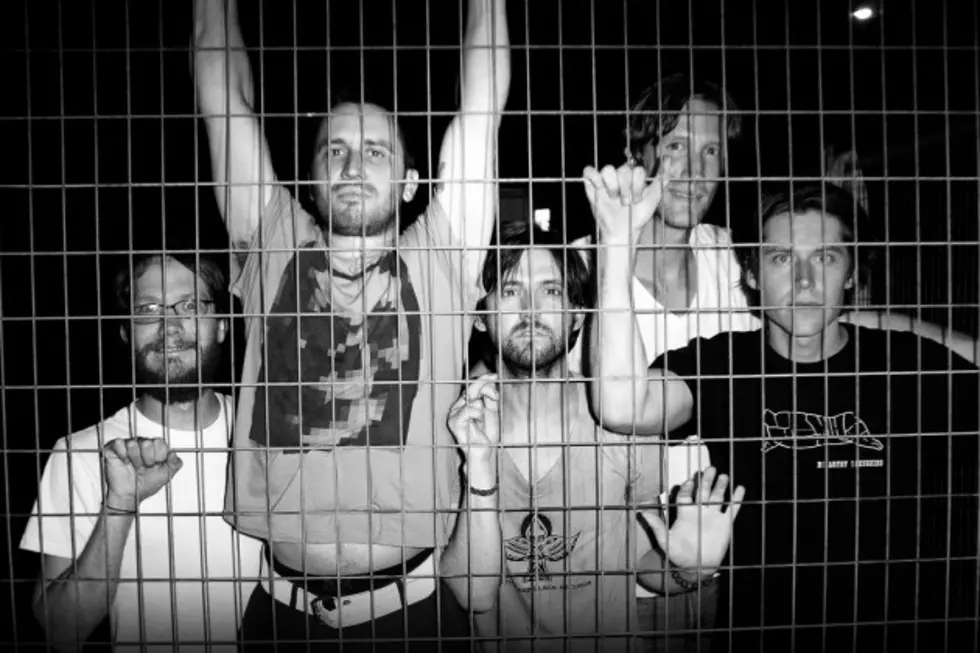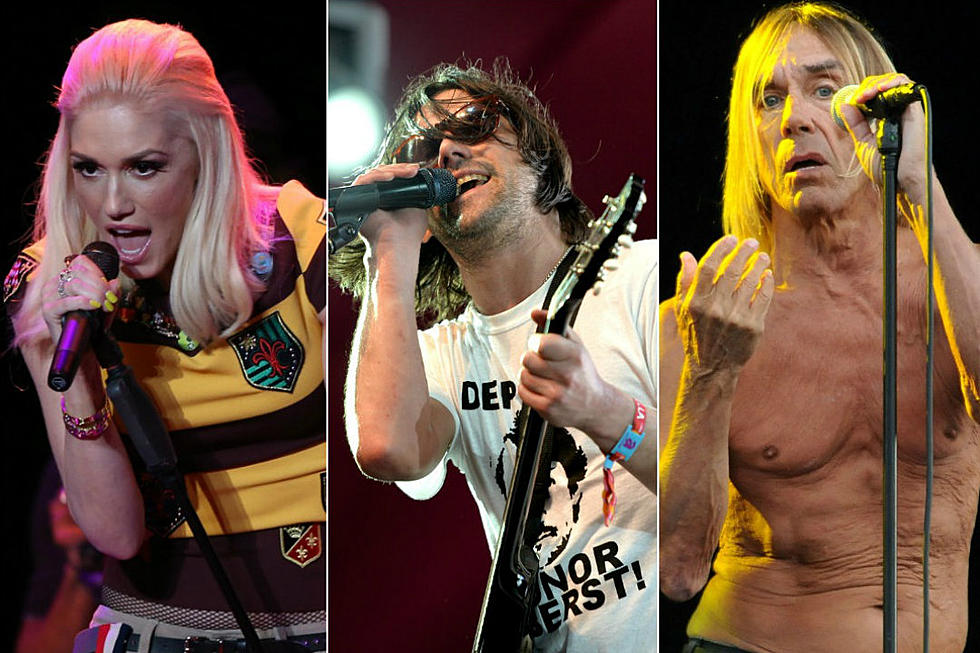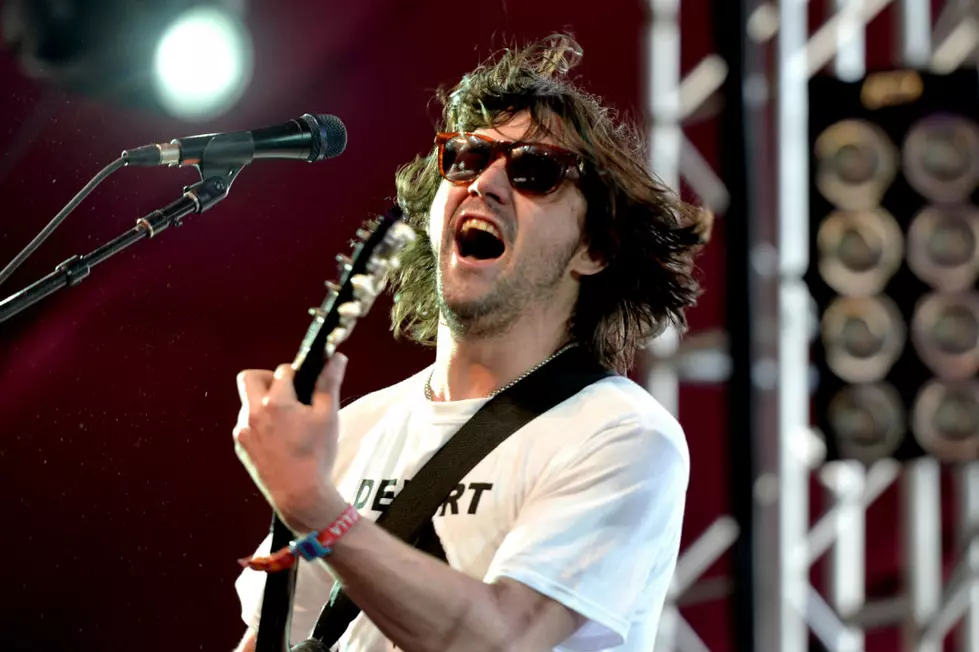
Desaparecidos’ Guitarist Denver Dalley on Sharing a Spotlight With Conor Oberst + More
If you weren't too keen on Bright Eyes or the emerging punk rock scene in Omaha, Neb., 12 years ago, then you very likely haven't heard of Desaparecidos until recently. That's because the Conor Oberst-fronted punk outfit took a lengthy hiatus after the 2002 release of their debut album, Read Music, Speak Spanish. But the quintet returned in June with Payola, a killer new album. We recently had a chance to talk to guitarist Denver Dalley (above, second from right) and he opened up about the new album, what he's been up to for the past decade and what he plans to do if the presidential election goes a certain way.
What the heck were you doing for all these years while Desaparecidos were on hiatus?
I have a solo project called Statistics that I did a bunch of tours with and I also played bass for Har Mar Superstar, which was a lot of fun. Other than that, I've also scored some commercials and an independent film or two for PBS – documentaries and such. I've kind of just been bouncing around, trying to keep busy. I stayed within music, always touring or recording or I even did some tour managing at some point.
You guys seemed to use a lot more electronics on the new album than you did on Read Music, Speak Spanish. Was that partially your influence carrying over from Statistics?
Maybe. I mean, we've always had electronics. Ian [McElroy] has always been our synth player and he and I tend to do the more electronic things; like my guitar is constantly getting confused with the keyboard because I play through all these crazy pedals and I'm just always trying to make my guitar sound like "not" a guitar. So, a lot of the time, people think it's programmed or electronic instruments or whatever. Ian tends to do more kind of soundscapes and low-end to help fill out, especially on our songs where our bass player Landon [Hedges] switches over to guitar. But I think between the two of us bring this sort of different edge that makes us sound like we're not just a straightforward garage band. There are other elements to it that help liven it up a bit. I think Payola has about the same level of electronics as the first one, it was just harder to hear in the mix since we had rushed it. For the new record, we just tried to mix the effects a lot louder and make it more prominent. Also, I think on the first record I was using probably about six or seven pedals and for this one I used about 24 or something like that, so there's a lot more stuff going on.
What are your thoughts on the rise of music streaming platforms?
Yeah, I mean it's always evolving and I think everyone is just trying to figure out how to adapt and make it work for them. I mean, obviously record sales are a fraction of what they used to be and a lot of people are focusing on licensing and that kind of stuff because they don't get very much at all from streaming. I've always been kind of philosophical about it and I've always felt that I'd rather people hear and discover the music. I think it's great that these sites are there so that people can discover stuff and hopefully buy it or just download it. But, either way, it's just nice to be heard and to get your message across.
Why is it important to talk about social and political issues in punk rock?
I think that for a long time, everyone was using music as a medium to convey a bigger or greater message and I think more and more every day, a lot of artists are just trying to come up with the best pop reference and the best catchy hook. It's become less about the content and more about getting it stuck in your head and onto the radio and YouTube. I've always felt that it was ideal to use the medium of your music – the idea that someone likes the song and it gets stuck in their head and they start listening to the lyrics and it inspires them to learn more about something they might not have known about.
What are your thoughts on Donald Trump possibly becoming the next president?
I think that might be the final blow to make me leave the country. I think that a lot of politicians are strictly the face of something bigger and you can kind of see how they would want someone who can take command and direction and look good doing it. I guess I've seen a lot of actors in politics. I think it's one thing to have an actor in politics and it's another thing to have a clown in politics. I guess they're all kind of clowns, really. A lot of that stuff I try to turn a blind eye to because it's so enraging, even though you can't, you have to know what's going on. Some of it is just so ridiculous. I think there's a candidate from North Carolina or something that's running called Deez Nuts. I think we're becoming more and more based on Idiocracy all of the time.
Is Conor Oberst's reputation what makes the band as popular as it is?
Definitely. He was in the band from day one and he already had success with Bright Eyes and people who know his other music want to hear this as well. That being said, there are definitely a lot of people out there who like our band but don't like Bright Eyes or Conor's solo stuff. He's a very prolific songwriter and he's been very important to the music, but I definitely think a lot of our popularity is from our accolades.
Was it hard to get Oberst back into the punk frame of mind?
No, he's always had that side to him. Back before Bright Eyes, he had a band called Commander Venus which was a loud, distorted guitar band. He's always been listening to bands like Fugazi and he always had that side to him. I think it's just fun for him to be able to explore that side when he's not doing the other stuff. Musically, I tend to come in with the riffs and we all just kind of build it together. Payola was more collaborative than the first record, so I think that was a really cool thing. This has always been a band rather than a side project. While we were writing it, we had to get out of town and away from distractions, so we rented a little house in Minnesota and worked on writing the songs together. I have some fond memories of the process. It took a long time. Conor has the final say on lyrics and, in the past, he would just go off and write everything and come back to us and that would be that. Luckily, we're all like-minded and see eye-to-eye on things. This time, it was much more collaborative and, at some points, we were literally sitting around a campfire talking about content. In the months leading up to it, we were e-mailing each other back and forth with ideas that inspired us. When we were writing, we also knew which song we wanted to use to tackle healthcare and which song we wanted to address another important issue. Then we would run out of songs to cover the topics we wanted and knew we needed more tunes.
Are we going to hear more new music soon or is it going to be another 12 years?
Man, I hope so. We're on tour now through Thanksgiving and, after that, it's a big question mark. I think we all enjoy hanging out and playing music together and writing. It's always a delicate balance of getting everyone's schedules aligned and everything. So I don't have an answer for you, but I can tell you that we're all enjoying it and we would love to keep doing it.
More From Diffuser.fm









